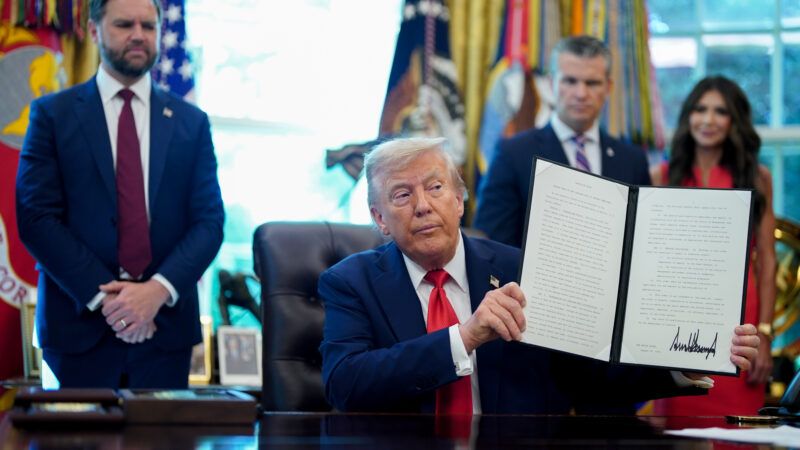Trump's Executive Order Prohibiting Flag Burning Is Unconstitutional
The president is the last person who should confuse protected speech with incitement to violence.

President Donald Trump issued an executive order prohibiting the burning of the American flag on Monday. There's a big problem with the order, though—one that Trump even acknowledged in his press conference touting the E.O. Flag burning is clearly protected by the First Amendment, and the Supreme Court has twice affirmed that this is so.
Moreover, any administration that purports to care about freedom of speech should easily reach the conclusion that criminalizing provocative yet nonviolent acts of political expression is a violation of this principle, even if the constitutional issue was not so cut and dry.
It's understandable why people don't like flag burning. The flag is a visual representation of the principles upon which America was founded, and when it's disrespected, many Americans take it as a sign that those values are being treated with contempt.
"Flag burning, all over the country they're burning flags," lamented Trump, as he signed the order.
Free speech, though, is among the most fundamental American values of all. The right of Americans to speak their minds is enshrined in the First Amendment; importantly, this right does not apply solely to benign, polite, socially acceptable speech. As one hundred years of Supreme Court jurisprudence has made clear, the First Amendment also protects hateful speech, wrongful speech, angry speech, criticism of the government, and so on. There are some exceptions to the First Amendment, but they are incredibly narrow—and importantly, they do not include flag-burning.
That's because the Supreme Court ruled on this very issue in the landmark 1989 case Texas v. Johnson, which overturned 48 state laws prohibiting desecration of the American flag. In response, Congress passed a federal law that prohibited flag burning, and the following year, the Supreme Court reached the exact same conclusion in United States v. Eichman. If the state-level bans are unconstitutional, and the ban implemented by Congress is unconstitutional, then you can pretty safely bet that the executive order version is even more obviously unconstitutional.
That's not how Trump sees it, of course. While signing the ban, Trump noted that the Supreme Court decisions on this issue were both 5–4. It's certainly possible that a future Court could rule a different way, and the composition of the Court has drifted further to the right since the early 1990s; on the other hand, there's little evidence that the current justices embrace a more limited view of the First Amendment.
With that in mind, the executive order grapples with the actually existing Court precedents in creative fashion, introducing the idea that while flag burning itself might be protected speech, flag burning "that is likely to incite imminent lawless action" could still be criminalized. This is true to the extent that incitement is one of the exceptions to the First Amendment. It isn't specific to flag burning though—an expressive action that incites other people to engage in specific, direct lawlessness might be outside the bounds of the First Amendment, whether or not the action has anything to do with the flag.
The key word there is might, however. There's obviously a fundamental difference between engaging in speech to directly advocate for a lawless action and burning the American flag, the latter of which is not a specific call for violence and lawlessness but could inspire others to commit lawlessness and violence.
It's a difference that the president should well understand. On January 6, 2021, in response to Trump's speech disputing the outcome of the 2020 presidential election, his supporters marched to the U.S. Capitol and rioted. Though their actions were undoubtedly sparked by Trump's remarks, Trump never instructed anybody to commit violence or lawlessness; on the contrary, he told them to "peacefully and patriotically make your voices heard." For that reason, Trump should have been cleared of incitement charges. (He was never criminally charged for incitement; the U.S. House of Representatives impeached him on this basis, and the Senate acquitted him.)
Unfortunately, Trump's executive order clearly seeks to erode this clear distinction between expressive acts that could inspire lawlessness and expressive acts that directly call for lawlessness.
"What happens when you burn a flag is the area goes crazy," said Trump, offering a justification for attempting to ban flag burning yet again.
If the federal government could abridge speech because other people might react negatively to it, then the First Amendment would cease to be a useful defense against censorship. The Trump administration should not even attempt to make this more of a reality, even while the Supreme Court is likely to thwart them.
In fact, Trump should take more of his cues from the late, archconservative Associate Justice Antonin Scalia, who twice sided with the majority and overturned the prohibitions on flag burning, defending his opinion thusly: "If it were up to me, I would put in jail every sandal-wearing, scruffy-bearded weirdo who burns the American flag. But I am not king."


Show Comments (195)